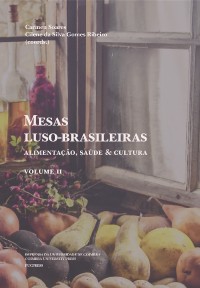Please use this identifier to cite or link to this item:
https://hdl.handle.net/10316.2/45252| Title: | Sistemas alimentares no Rio de Janeiro, séculos XVIII e XIX | Other Titles: | Food Systems in 18th and 19th century Rio de Janeiro | Authors: | Lima, Tania Andrade | Keywords: | Urban Archaeology;Colonial Rio de Janeiro;Food Systems;Urban Slavery;arqueologia urbana;Rio de Janeiro colonial;sistemas alimentares;escravidão urbana | Issue Date: | 2018 | Publisher: | Imprensa da Universidade de Coimbra | Journal: | http://hdl.handle.net/10316.2/45207 | Abstract: | The aim in this set of articles is to provide an overview of food systems
in the city of Rio de Janeiro in the eighteenth and nineteenth centuries, based on
the results obtained by excavations undertaken at various archaeological sites in the
historical centre of Rio de Janeiro. Food system here refers to a set of elements and
activities in interaction (whereby the alteration of one causes alterations in all the
others), beginning with the choice of food, its storage, processing and consumption,
and ending with its disposal, the last stage of the process. These activities are examined through the physical evidence recovered in the archaeological investigations,
namely: bone fragments of consumed animals, ceramic vessels for storing and
processing foods, and tin-glazed European earthenware used to serve and consumer
the food, as well as the area where these objects were discarded. The two centuries
were analysed comparatively on the premise that the transfer of the capital of the
Portuguese Empire to Brazil in 1808 was a watershed moment that led to profound
changes in the colonial world, including a strong impact on everyday life, changes
that may well have extended to the food domain. Neste conjunto de artigos pretendemos apresentar um panorama dos sistemas alimentares na cidade do Rio de Janeiro nos séculos XVIII e XIX, a partir dos resultados por nós obtidos em escavações realizadas em sítios arqueológicos localizados no centro histórico do Rio de Janeiro. Por sistema alimentar entendemos um conjunto de elementos e atividades em interação solidária (de tal forma que a alteração em um deles determina alterações em todos os demais), começando pela escolha do alimento, sua armazenagem, processamento, consumo, e finalizando com seu descarte, a última etapa desse processo. Essas atividades foram examinadas aqui a partir dos seus suportes materiais recuperados nas pesquisas arqueológicas, a saber: restos ósseos dos animais consumidos, vasilhames cerâmicos utilizados no armazenamento e processamento de comidas, e as faianças europeias nos quais eles foram servidos e consumidos, além da área onde eles foram descartados. Os dois séculos foram analisados comparativamente, por entendermos que a transferência da capital do império português para o Brasil, em 1808, foi um divisor de águas que introduziu mudanças profundas no universo colonial, inclusive interferindo fortemente na sua vida cotidiana, mudanças essas passíveis de terem sido estendidas ao domínio alimentar. |
URI: | https://hdl.handle.net/10316.2/45252 | ISBN: | 978-989-26-1719-0 978-989-26-1720-6 (PDF) |
ISSN: | 2183-6523 | DOI: | 10.14195/978-989-26-1720-6_12 | Rights: | open access |
| Appears in Collections: | Mesas luso-brasileiras: alimentação, saúde & cultura. vol. II |
Files in This Item:
| File | Description | Size | Format | |
|---|---|---|---|---|
| sistemas_alimentares_no_rio_de_janeiro__seculos_xviii_e_xix.pdf | 1.03 MB | Adobe PDF |  |
Items in DSpace are protected by copyright, with all rights reserved, unless otherwise indicated.
